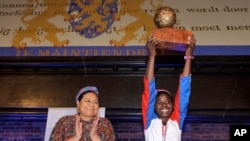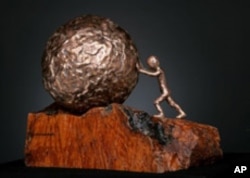A 16-year-old girl from the Dominican Republic has received the 2010 Children's Peace Prize. Francia Simon campaigned for the right of all children in the country - native-born and refugee - to be registered, with a birth certificate, so they could gain access to health care and education.
The Children's Peace Prize is presented by the KidsRights Foundation, an international children's advocacy group based in Amsterdam. It is awarded each year to a child who has made a difference in tackling problems which affect children worldwide. Simon's personal situation inspired her campaign to help others.
"She didn't have a birth certificate and in the school, they were giving her a lot of pressure because she needed to have a birth certificate to continue in school," says says Ellen Vroonhof, an award spokesperson. "Then when she had her own, she saw that other boys and girls within the community don't have their own birth certificate and couldn't go to school. That's why she used her example to help others in her community to go to school."
The KidsRights Foundation made a 100,000 euro donation to projects closely connected to Simon's cause.
Making a difference
One of four finalists for this year's prize was Tatiana Grossman, who has always loved reading. When the 15 year old from Palo Alto, California, learned that many children in Africa don't have enough books to read, she decided to get some for them.
"I founded an organization called African Library Project that helped people start libraries. So I set up a book drive and ended up collecting 3,500 books in a week," she says. "So I shipped those books and just kept going after that. It was great."
The books went to school and public libraries in Botswana and Lesotho. The positive feedback she's received, made her even more determined to foster reading and advance literacy.
"I'm always going to keep collecting books for more libraries," Grossman says. "I also want to inspire others to do the same. Right now, I'm working in ways to find digital text books to send over because regular text books are expensive to ship and they don't have text books over there."
Two other finalists came from Africa.
"Emmanuel from Rwanda, he actually started a small project within his own community," says Vroonhof. "He grew some chickens and made small pocket money to pay his school fees. So he has made sure that the children themselves can also contribute within their community and make sure they can go to school. The other finalist is Getahun from Ethiopia. He's fighting against violence within schools."
Vroonhof says it's often hard to choose a winner since all the nominees have used their caring, courage and intelligence to make a difference in the world around them.
"They are very special. We still don't know what exactly it is that they have, which makes them different from other children," she says. "But I think most of it is determination. They move beyond the obstacles they encounter in their life."
Bringing attention to serious issues
The KidsRights Foundation was founded by Dutch media executive Marc Dullaert in 2003, to raise money for local aid projects that support children's rights. He began presenting the Children's Peace Prize two years later.
"I saw the Nobel Peace Prize ceremony on TV and at that moment I though, 'Why isn't there a peace price for children' because there are many brave children who do wonderful things for other children," Dullaert says. "I tried to get in contact with the Nobel committee in Oslo, and it wasn't possible to make a children's peace prize."
He had better luck with former President Gorbachev of the Soviet Union, then-president and chairman of the Nobel Prize laureate summit which takes place every year in Rome. Gorbachev presented the first Children's Peace Prize in 2005 - posthumously - to Nkosi Johnson. The South African boy fought for the right of children with HIV/AIDS to go to school. Each year since then, Dullaert says, the award winners have brought attention to serious issues they're trying to solve in their communities.
"In 2006, a former slave child from India won the Children's Peace Prize," he says. "His name is Om Prakash. It was the first time in history the child slavery was really acknowledged in India. This boy was invited by the Indian government. He got the highest press prize in his country. During that time also, Mr. Gordon Brown at that time the United kingdom's Minister of Finance, was on a regular visit and gave the Indian government 200 million pounds to eradicate child slavery and literacy."
The following year, the prize went to a girl from Zambia who promotes youth education, and a Brazilian teen was honored in 2008 for battling the extreme violence in Rio's poorest neighborhood. Last year's winner, an orphan living in a refugee camp in Tanzania, produces a radio program dealing with the problems facing young refugees.
The Children's Peace Prize, Dullaert says, recognizes these young leaders and helps spread their message. More importantly, he says, it highlights the right of children all over the world to play a role in creating the good life they want and deserve.






